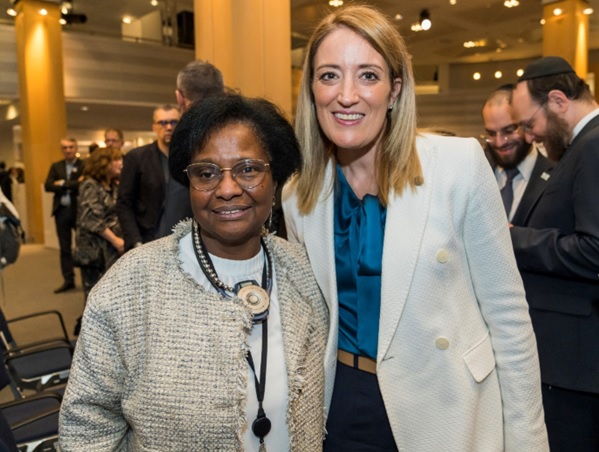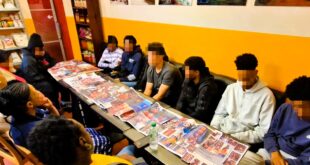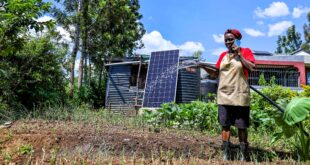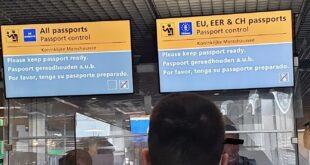People of African Descent who were victims of fascist violence during the Third Reich should not be forgotten, writes Dr Pierrette Herzberger-Fofana*. The European MP narrates her efforts in the past twenty years to promote an increased awareness of the ‘other’ victims of Nazi barbarism who are often neglected in the mainstream history books and argues why it’s important to update the history of the Second World War with regard to the fate of people of African descent
—-

Brussels. On 26 January the European Parliament commemorated the liberation of the Nazi concentration camps and the International Holocaust Remembrance Day in the presence of President Isaac Herzog of the State of Israel, the president of the European Parliament, Mrs Roberta Metsola, members of the European Parliament and of interested civil society.
27 January 1945 marked the liberation, the end of an immeasurable suffering. On that day, Auschwitz was liberated – the concentration camp, in which more than a million people had been killed between 1940 and 1945 alone.
The United Nations on 1 November 2005 declared 27 January “International Day of Commemoration for the Victims of the Holocaust”. A few years prior to that declaration, the Council of Europe had already declared the same date as the “European Day of Remembrance of the Holocaust and Prevention of Crimes against Humanity”.
Among these victims of the Holocaust are Africans and Afro-Germans, whose ordeal is still very little known.
People of African descent who lived in Germany during the time of National Socialism were victims of Nazi barbarism. They were discriminated against and in many cases lost their jobs and German citizenship. Worse still, they were victims of sterilisation, imprisonment and murder. As part of the Nazi-euthanasia programme, they were used as guinea pigs for medical experiments.

The direct confrontation with the memory of the Holocaust reminds us of the extent of the cruelty of the Nazi regime. When I started to visit the concentration camps and their respective archives some twenty years ago, I was stunned by what I saw and read.
Auschwitz, Dachau, Buchenwald, Mauthausen, Neuengamme, Sachsenhausen, Bergen-Belsen. The horror of these places got under my skin and never left me. It caused in me the need to react against any expression of contempt, negation and racism towards the other. For this is how infamies begin. We all know that.
The history books of the Holocaust did not take into account the murders of people of African descent. What does this say about our society? What does it say about our collective conscience?
This is not about making comparisons between victim groups. The suffering of the victims of the Nazis is human pain. They cannot be transformed into a “competition of victims” because there is no degree of suffering, but a unique human pain. It is estimated that between 2000 and 3000 Africans and people of African descent lost their lives because of the Nuremberg “race laws”!
Anti-Black racism is still unknown and repressed in many places. However, children and young people of African descent deserve to enjoy a future free of racist attacks and discrimination.
It is important to reflect on the teaching of history and its relationship to racism. It is therefore essential to update the history of the Second World War with regard to the fate of people of African descent.
At the beginning of my research on the fate of Black people during the Third Reich, I found only a few puzzle pieces. Gradually they came together to form a picture, a frightening mosaic.
I would like to introduce to you a survivor, whose existence was repressed in a memory vacuum. Gert Schramm (1928-2016), who was incarcerated in Buchenwald at the age of 14, an author of a biography in German and activist for anti-racist education.
My meeting with him birthed my desire to give a name to the “forgotten of history” and to set up a culture of remembrance, of duty and memory. Thus, in 2015 I created the “Black History Weeks” in Erlangen in the framework of the UN Decade for People of African Descent (2015-2024).
At the launch event of the Black History Weeks, three witnesses, – Afro-Germans and victims of the Nazi regime – took part. These survivors are Gert Schramm, Marie Nejar, and Theodor Wonja Michael (Theodor Wonja Michael’s book is translated into English. “Black German: an Afro-German life in the twentieth century”)
In a letter to German Chancellor Angela Merkel in March 2015, I asked her to honour the group of African descent and non-European concentration camp inmates. In her speech to commemorate the 70th anniversary of the liberation of the Dachau camp on 4 May 2015. Mrs Merkel considered my request and said:
“They were men, women and children. They came from all over Europe. They also came from many other parts of the world, from Asia, but also – and this is still little known to the public – from parts of Africa, from Congo, Senegal and Eritrea. We pay tribute to the 41,500 people who did not survive this hell.”
The more we bear witness to the atrocities committed by the Nazis, the more we fully understand what the Nazi ideology has caused, the better we can continue to prepare for a peaceful future. This is even more necessary given the growth of far-right parties in many parts of Europe and the world.
In memory of the victims of the Holocaust, we must not leave anyone behind; we must not leave any fate untouched.
Every year on 27 January, we need to revisit the extent of the abuses committed against the Jewish people, the scars left on the Jewish people.
We are saddened, stunned and convinced. Convinced to renew our vigilance in the face of growing right-wing tendencies marked by contempt for human beings. Stunned and convinced to recommit ourselves to say never again, in the face of an almost unimaginable form of cruelty. A cruelty that has cost the lives of millions of people. Jews, Romani people, people with disabilities, LGBTQI, communists, Jesuits and priests, Jehovah’s Witnesses, social democrats, the so-called antisocial, resistance fighters and also Black people, people of African descent, Afro-Germans and many other minorities.
May we live together in a spirit of tolerance and treat people of all religions, creeds and skin colours with respect!
—
The author, Dr Pierrette Herzberger-Fofana, MEP, is a Member of the European Parliament representing Germany on the platform of the Green party. She is also Vice-Chairwoman of the Committee on Development, Vice-President of the Delegation for Relations with the Pan-African Parliament and Co-President of the EU-ARDI Intergroup “Anti Racism and Diversity Intergroup”
 THE AFRICAN COURIER. Reporting Africa and its Diaspora! The African Courier is an international magazine published in Germany to report on Africa and the Diaspora African experience. The first issue of the bimonthly magazine appeared on the newsstands on 15 February 1998. The African Courier is a communication forum for European-African political, economic and cultural exchanges, and a voice for Africa in Europe.
THE AFRICAN COURIER. Reporting Africa and its Diaspora! The African Courier is an international magazine published in Germany to report on Africa and the Diaspora African experience. The first issue of the bimonthly magazine appeared on the newsstands on 15 February 1998. The African Courier is a communication forum for European-African political, economic and cultural exchanges, and a voice for Africa in Europe.

































